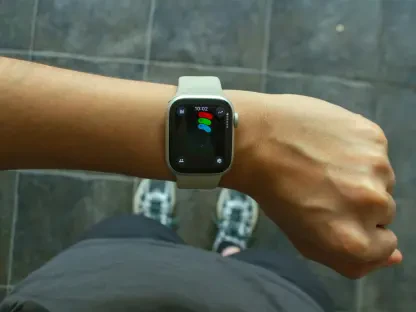In recent years, the health technology landscape has seen monumental advancements, with Garmin introducing its latest innovation, the Index Sleep Monitor, drawing considerable attention. This wearable sleep tracker has piqued the interest of fitness technology aficionados with its sophisticated approach to monitoring sleep patterns. Resembling the Whoop device, it is designed to be worn on the upper arm, utilizing an optical sensor in conjunction with an LED light and vibration module to deliver a nuanced analysis. The device promises to go beyond basic sleep monitoring by measuring sleep stage duration, heart rate, blood oxygen levels, and respiration, skin temperature, and offering health insights tailored explicitly for women. Offering around a week of battery life and priced at approximately $170, the Index Sleep Monitor provides an intriguing peek into the future of health tech, potentially finding seamless integration with the Garmin Connect app to offer users in-depth sleep statistics. Unlike certain competitors, Garmin’s model focuses not on subscription but offers advanced features through a reasonable monthly or annual fee for its Active Intelligence AI service.
Advanced Sleep Monitoring Features
The Index Sleep Monitor appears to be paving the way for a more refined approach to sleep tracking, combining both cutting-edge technology and user-friendly features. One of the standout aspects of this device is its ability to provide a detailed breakdown of sleep stages, an essential metric for those looking to enhance their sleep quality and overall health. By employing advanced sleep stage analysis, users can gain insights into REM, light, and deep sleep stages, thus enabling them to make more informed decisions regarding their sleep hygiene. In tandem with this functionality, the Index Sleep Monitor also records continuous data on heart rate and blood oxygen levels throughout the night. These measurements are crucial indicators of cardiovascular and respiratory health, factors that significantly influence overall well-being. Beyond general metrics, the device provides users with a comprehensive understanding of their nighttime physiological changes, encouraging them to integrate better habits and support improved sleep patterns.
Another compelling feature is its adaptability, as it extends its benefit through specialized health insights for women. These tailored insights can track changes in skin temperature and other vital statistics that may vary according to hormonal fluctuations, a feature that adds another layer of specificity to the device. The added emphasis on women’s health represents Garmin’s commitment to addressing diverse health needs, reinforcing its position as a forward-thinking leader in health tech. By marrying sophisticated technology with highly specific health insights, the Index Sleep Monitor positions itself as an invaluable tool for those who demand detailed, personalized health data.
Market Trends and Future Implications
As Garmin steps further into the realm of health monitoring, the Index Sleep Monitor reiterates a growing trend of increasing accessibility to personal health data through smart technology. While sleep tracking is its primary focus, its integration capabilities with the Garmin Connect app suggest a future where a holistic perspective on health is more achievable than ever before. This evolution aligns with broader industry trends that prioritize user-friendly health insights, offering individuals the opportunities to embark on a personalized health journey without needing an intermediary health professional.
Moreover, the competitive pricing model, combined with Garmin’s existing technological ecosystem, positions the Index Sleep Monitor to attract a diverse audience, ranging from casual health enthusiasts to serious athletes. Unlike some competitors who may rely heavily on subscription models, Garmin offers flexibility and choice, which is likely to appeal to those cautious about additional ongoing expenses. This release underscores Garmin’s continued dedication to expanding its health tech offerings, with the potential for broader adoption effectively highlighting the importance of sleep in achieving well-rounded health and fitness objectives.
The Road Ahead for Health Technology
In recent years, health technology has experienced significant progress, notably marked by Garmin’s latest creation, the Index Sleep Monitor. This advanced sleep tracker has captured the attention of fitness tech enthusiasts with its enhanced method of evaluating sleep patterns. Similar to the Whoop device, it is designed for the upper arm, utilizing an optical sensor, LED light, and vibration module to offer detailed sleep analysis. Beyond the basics, this device monitors sleep stage duration, heart rate, blood oxygen levels, respiration, and skin temperature. Additionally, it provides health insights specifically geared towards women. With approximately a week-long battery life, the device is priced around $170. The Index Sleep Monitor represents a step forward in health technology, promising potential integration with the Garmin Connect app for comprehensive sleep data. Unlike some rivals, Garmin’s model prioritizes features without requiring a subscription, though access to its Active Intelligence AI service comes with a reasonable monthly or annual fee.









